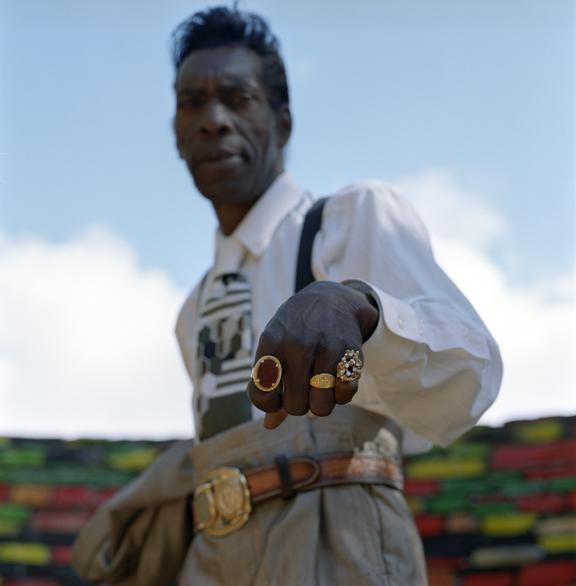It looks like you're using an Ad Blocker.
Please white-list or disable AboveTopSecret.com in your ad-blocking tool.
Thank you.
Some features of ATS will be disabled while you continue to use an ad-blocker.
2
share:
Darondo. What a name.

In an interview, Darondo explains his stage name comes from a play on Daron's got dough- Darondo.
Darondo has a small but coveted repertoire of soul/funk songs which he recorded in the late 60s/early 70s.
He sounds like quite the character. Some excerpts from an article about Darondo:
Some rumors remain about Daron's pre-music career.
A pimp with a heart of gold and the voice of an angel. During his later years working as a physical therapist, Darondo, born William Daron Pulliam, would play music for his patients, an early nod to the gains made in the music therapy industry today (look into music and Alzheimers if you haven't heard about the impact of music on dis-ease).
www.waxpoetics.com...
The world lost an interesting character in 2013. Luckily for us, Darondo left behind a small but incredible legacy. Check it out!
I'll post a few more for your enjoyment. Have a great day friends!!!

In an interview, Darondo explains his stage name comes from a play on Daron's got dough- Darondo.
Darondo has a small but coveted repertoire of soul/funk songs which he recorded in the late 60s/early 70s.
He sounds like quite the character. Some excerpts from an article about Darondo:
Music was always a hobby; as a young man in his twenties, Darondo had actually trained to be an electrician. However, when he half-seriously told his friends that he wanted to record a record, their skepticism only fueled his desire to go out and get it done. “So many people out there were talking, ‘Darondo, you’re not going to do nothing,’ ” he recalls. He responded by insisting, “I’m going to show you suckers something. I don’t care if I have to do it myself; I’m going to put this thing out.”
Some rumors remain about Daron's pre-music career.
One of the great ironies to Darondo’s music is that as angelic as his voice could be, his day-to-day life and profession were bound up in the earthliest of human desires. The man was a pimp—literally. For many years, both preceding and following his music career, Darondo was a local pimping legend, on par with Fillmore Slim and other Player’s Ball VIPs.
To be sure, it’s a topic that the man himself refuses to speak about, neither confirming nor denying, though he does elliptically refer to it as his “fast life” days. If even half the stories of his pimping days are true, “fast” is an understatement. Not only did the lifestyle pay well—he didn’t get the nickname “Rolls Royce” for running a car dealership—but it also brought him into contact with many local notables, including Sly Stone, whose infamous mansion/home studio was a frequent destination for Darondo and his stable of women.
Even in the midst of this life, Darondo could see the dark side creeping up. Though he recorded “Let My People Go” about ten years before he got out of pimping for good, he explains that the song encapsulated much of the concern he felt for those who couldn’t handle the fast life. “People wanted the money thing; if it ain’t about money, it’s about sex. In the end of it, all it adds up to is destruction. That’s why I was singing, ‘Let My People Go.’ I’m talking about: give us a land, or island in the sea, good food so we can work the land, so we could all live in harmony—the Black man, the White man—everybody lives in peace. All you other suckers, go ahead and do what you want to do.”
A pimp with a heart of gold and the voice of an angel. During his later years working as a physical therapist, Darondo, born William Daron Pulliam, would play music for his patients, an early nod to the gains made in the music therapy industry today (look into music and Alzheimers if you haven't heard about the impact of music on dis-ease).
While he wasn’t recording music anymore, he still found ways to use his singing and playing to positive effect. In another strange twist of careers, Darondo ended up as a physical therapist for a few years, after his TV days had ended. He’d bring his guitar into the hospital and play for the sick and infirm, and, as a form of therapy, it often produced unexpected results, even from those suffering from paralyzing strokes. “I was amazed at the responses I was getting for the music,” he says. “They would be sitting up there all day, trying to blink their eye or do something. The music, a lot of the time, would bring stuff out of them.”
www.waxpoetics.com...
The world lost an interesting character in 2013. Luckily for us, Darondo left behind a small but incredible legacy. Check it out!
I'll post a few more for your enjoyment. Have a great day friends!!!
edit on 30-4-2018 by zosimov because: (no reason given)
new topics
-
Planned Civil War In Britain May Be Triggered Soon
Social Issues and Civil Unrest: 14 minutes ago -
Claim: General Mark Milley Approved Heat and Sound Directed Energy Weapons During 2020 Riots
Whistle Blowers and Leaked Documents: 1 hours ago
2
